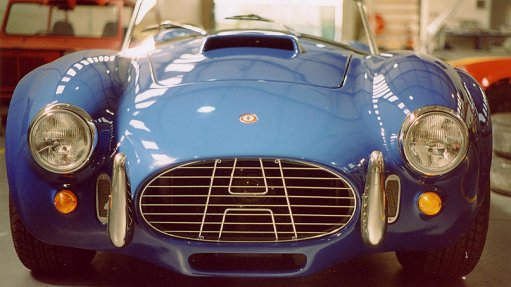
The Hayden Cobra
Les Hayden’s Cobra replica assembly line in Cape Town is up and running again, following a change in ownership.
Automotive Investment Holdings (AIH) in 2017 initiated a project to modernise the Hayden Cobra, but sold its interest in the venture after a decision to return to its core business of consulting to the automotive industry.
Hayden, as the vehicle developer, has since secured a new partner, in the form of Willie Oosthuizen, with a new company registered as Hayden Cobra.
Oosthuizen is a keen Cobra enthusiast and a chartered accountant by training. He is currently the COO of a company active in the food industry.
“The Cobra project excited me from the first time I met Les,” says Oosthuizen.
“I realised the potential of this project, especially with the big number of people who share a passion for this iconic vehicle. In my opinion this project encompasses the potential trinity – quality, demand and passion.”
Oosthuizen says he is responsible for the finance and business operations of the new Cobra venture, while Hayden focuses on building and developing the sports car for the local and export markets.
“We are initially targeting the US and Middle East markets, and also have an agent for Australia. We have recently also received some interest from Europe, so we intend to explore that market too,” notes Hayden.
He says his cars are designed for the left- and right-hand-drive markets.
“We are offering two versions, the Classic 427, which is aimed at those enthusiasts who want their car to look exactly like the original version, and our Evo model, which features improvements such as electric side windows and air conditioning.”
Hayden is also developing an electric Cobra, as the global automotive industry increasingly moves to electrification.
“On the advice of our consultant Dr Ian De Vries, an electrical engineer with many years’ experience in electric vehicle applications and battery technology, we’ll initially be using lithium iron phosphate batteries.
“We’ll also supply the charging system, including a charge/discharge control system designed by Dr De Vries, which protects battery cells from over-charging and discharge damage.”
Hayden says although the expected market for this product is in Europe, the company already has a local enthusiast on the waiting list.
Hayden Cobra can currently produce around ten cars a month, but this is expected to increase in the next 12 months.
The standard vehicle is mostly shipped without engine and gearbox, with the local content more than 90% in terms of costing.
“We are not willing to compromise on quality in the interests of rapid growth,” explains Hayden. “We need to create a dedicated team of people building the cars, and it takes time to select and train the right people who enjoy their work and feel a sense of pride in what they are producing.”
Hayden started with his first Cobra design when he was a partner in a marine engineering business.
“The intention was to just build one for myself. However, as word got out I was soon inundated with enquiries and, before long, I was in the sports car manufacturing business.”
“I started advertising my cars in 1984.”
Hayden says there are a number of companies producing Cobra replicas around the world.
“I have visited many of them and found few to be impressive. Many focus on originality, even when it comes to supplying a crude ladder frame chassis like the original Cobra, which was not a great handler at speed.
“I decided to rather build a more modern structure and use finite element method stress analysis to optimise the chassis and suspension components.
“As a result we now have a chassis that is torsionally far stiffer than that of the original, as well as a very strong suspension.”
Hayden was assisted by Dr Andy Yates of the University of Cape Town’s mechanical engineering department to design a more sophisticated independent suspension system that provides anti-squat and anti-dive properties without the usual side effects, such as caster-angle variation under braking.
“Our modern chassis and suspension system under the classic styled bodywork provides greatly improved handling and road-holding at high speeds, and feels much safer,” he says.
“We don’t put used suspension parts from scrap yards on our cars, but manufacture all our own components, such as the uprights and wishbones, to our own design.
“Our brakes are new BMW rotors with specially machined aluminium six pot and four pot callipers made from solid billet.
“We also dealt with complaints from tall drivers by dropping the floor under the seats by 100 mm,” notes Hayden.
“Our bodies are laminated using vinyl-ester resin with a higher heat distortion factor and higher impact strength. This is a more costly alternative to the usual polyester general purpose resin, but provides a more stable and stronger body.”